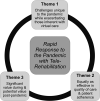Physiotherapists' Adoption and Perceptions of Tele-Rehabilitation for Cardiorespiratory Care in Response to COVID-19
- PMID: 38725596
- PMCID: PMC11078246
- DOI: 10.3138/ptc-2021-0135
Physiotherapists' Adoption and Perceptions of Tele-Rehabilitation for Cardiorespiratory Care in Response to COVID-19
Abstract
Purpose: The use of tele-rehabilitation as a mode for physiotherapy services was widely implemented following the onset of the coronavirus disease 2019 (COVID-19) pandemic. This study explored the perceived value and experiences of physiotherapists relating to tele-rehabilitation for cardiorespiratory care.
Method: Semi-structured interviews were conducted with physiotherapists who provided tele-rehabilitation to adults with cardiorespiratory conditions between March 11 and December 31, 2020. Interviews were analyzed using conventional content analysis.
Results: Seven participants were interviewed; six practising solely in pulmonary rehabilitation and one practising in both pulmonary and cardiac rehabilitation. Three major themes emerged: (1) the pandemic presented unique challenges to implementing tele-rehabilitation while exacerbating previous challenges inherent with virtual care, (2) tele-rehabilitation use during the pandemic was deemed as equally effective in quality of care and patient adherence when compared to in-person services, and (3) tele-rehabilitation had significant value during the pandemic and has potential as an alternative delivery model post pandemic.
Conclusion: Despite the inherent challenges, tele-rehabilitation was endorsed by participants as a suitable and effective alternative to care delivery and holds promise as a post-pandemic delivery model. Further evaluation is needed to support and optimize tele-rehabilitation use in physiotherapy practice.
Objectif: les services de téléréadaptation en physiothérapie ont été largement mis en place après le début de la pandémie de maladie à coronavirus 2019 (COVID-19). La présente étude a exploré la perception d’utilité et les expériences des physiothérapeutes à l’égard des soins cardiorespiratoires en téléréadaptation.
Méthodologie: les chercheurs ont fait des entrevues semi-structurées auprès de physiothérapeutes qui ont donné des services de réadaptation à des adultes atteints d’affections cardiorespiratoires entre le 11 mars et le 31 décembre 2020. Ils ont analysé les entrevues au moyen d’une analyse de contenu classique.
Résultats: Sept participants ont participé à l’entrevue, dont six effectuaient seulement de la réadaptation pulmonaire et le dernier, à la fois de la réadaptation pulmonaire et cardiaque. Trois grands thèmes en sont ressortis : 1) la pandémie a soulevé des défis uniques liés à la mise en œuvre de la téléréadaptation tout en exacerbant des problèmes déjà inhérents aux soins virtuels, 2) le recours à la téléréadaptation pendant la pandémie était considéré comme aussi efficace pour la qualité des soins et l’adhésion des patients que les services en personne et 3) la téléréadaptation était très utile pendant la pandémie et a du potentiel comme autre modèle de prestation après la pandémie.
Conclusion: malgré des difficultés inhérentes, les participants ont trouvé que la téléréadaptation était une solution appropriée à la prestation des soins et qu’elle se révélait un modèle de prestation prometteur après la pandémie. Une évaluation plus approfondie s’impose pour soutenir et optimiser le recours à la téléréadaptation en physiothérapie.
Keywords: COVID-19; cardiac rehabilitation; pulmonary rehabilitation; telemedicine; virtual rehabilitation.
© Canadian Physiotherapy Association, 2024.
Conflict of interest statement
Competing Interests: The authors have no conflicts of interest to declare.
Figures
References
-
- Lawford BJ, Delany C, Bennell KL, et al. “I was really pleasantly surprised”: firsthand experience and shifts in physical therapist perceptions of telephone-delivered exercise therapy for knee osteoarthritis-a aualitative study. Arthritis Care Res (Hoboken). 2019;71(4):545–57. 10.1002/acr.23618. Medline: - DOI - PubMed
-
- Lawford BJ, Delany C, Bennell KL, et al. “I was really sceptical…... But it worked really well”: a qualitative study of patient perceptions of telephone-delivered exercise therapy by physiotherapists for people with knee osteoarthritis. Osteoarthr Cartil. 2018;26(6):741–50. 10.1016/j.joca.2018.02.909. Medline: - DOI - PubMed
-
- Kairy D, Poissant L, Rushton P, et al. Telerehabilitation implementation and routine clinical use: preliminary findings from a case study across three rehabilitation centers. In: 2017 International Conference on Virtual Rehabilitation (ICVR). IEEE; 2017. p. 1–2. 10.1109/ICVR.2017.8007529 - DOI
LinkOut - more resources
Full Text Sources

